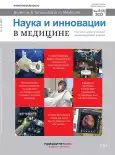Влияние сухого экстракта листьев омелы белой на изменение вазодилатирующей функции эндотелия сосудов головного мозга у крыс в условиях хронической алкогольной интоксикации
- Авторы: Поздняков Д.И.1, Вихорь А.А.1, Аджиахметова С.Л.1
-
Учреждения:
- Пятигорский медико-фармацевтический институт – филиал ФГБОУ ВО «Волгоградский государственный медицинский университет» Минздрава России
- Выпуск: Том 8, № 3 (2023)
- Страницы: 210-214
- Раздел: Фармакология, клиническая фармакология
- URL: https://bakhtiniada.ru/2500-1388/article/view/249951
- DOI: https://doi.org/10.35693/2500-1388-2023-8-3-210-214
- ID: 249951
Цитировать
Полный текст
Аннотация
Цель – изучить влияние сухого экстракта омелы белой на изменение вазодилатирующей функции эндотелия сосудов у крыс в условиях хронической алкогольной интоксикации.
Материал и методы. Хроническую алкогольную интоксикацию моделировали у крыс-самок линии Wistar, путем курсового перорального введения этанола из расчета 3г/кг/день. Изучаемый экстракт и препарат сравнения – этилметилгидроксипиридина сукцинат вводили per os в дозе 100 мг/кг. Вазодилатирующую функцию эндотелия сосудов оценивали по изменению скорости мозгового кровотока при модификации синтеза эндогенного оксида азота. Концентрацию активных форм эндотелиальной и индуцибельной изоформ синтазы оксида азота определяли методом иммуноферментного анализа.
Результаты. Курсовое введение исследуемого экстракта и препарата сравнения приводило к повышению скорости церебрального кровотока по отношению к нелеченым животным на 48,1% (p<0,05) и 40,2% (p<0,05) соответственно. Также отмечено восстановление эндотелий-зависимой вазодилатации сосудов головного мозга на фоне введения изучаемого экстракта омелы белой и референс-препарата. Анализ изменения NO-синтазной системы показал, что при применении исследуемого экстракта концентрация eNOS увеличилась на 76,3% (p<0,05), а iNOS, напротив, уменьшилась на 22,1% (p<0,05), что было сопоставимо с показателями группы животных, получавших референс-препарат.
Заключение. Применение сухого экстракта листьев омелы белой приводит к восстановлению эндотелий-зависимой вазодилатации церебральных сосудов у крыс с хронической алкогольной интоксикацией, вероятно, за счет улучшения eNOS-зависимых механизмов синтеза оксида азота.
Ключевые слова
Полный текст
Открыть статью на сайте журналаОб авторах
Дмитрий Игоревич Поздняков
Пятигорский медико-фармацевтический институт – филиал ФГБОУ ВО «Волгоградский государственный медицинский университет» Минздрава России
Автор, ответственный за переписку.
Email: pozdniackow.dmitry@yandex.ru
ORCID iD: 0000-0002-5595-8182
канд. фарм. наук, доцент кафедры фармакологии с курсом клинической фармакологии
Россия, ПятигорскА. А. Вихорь
Пятигорский медико-фармацевтический институт – филиал ФГБОУ ВО «Волгоградский государственный медицинский университет» Минздрава России
Email: nastyavihori@gmail.com
студентка 4 курса лечебного факультета
Россия, ПятигорскС. Л. Аджиахметова
Пятигорский медико-фармацевтический институт – филиал ФГБОУ ВО «Волгоградский государственный медицинский университет» Минздрава России
Email: sima503@mail.ru
ORCID iD: 0000-0001-9685-1384
канд. фарм. наук, доцент кафедры органической химии
Россия, ПятигорскСписок литературы
- World Health Organization. Global Status Report on Alcohol and Health 2018. Geneva, Switzerland, 2018.
- Abrahao KP, Salinas AG, Lovinger DM. Alcohol and the Brain: Neuronal Molecular Targets, Synapses, and Circuits. Neuron. 2017;96(6):1223-1238. doi: 10.1016/j.neuron.2017.10.032
- Trudell JR, Messing RO, Mayfield J, Harris RA. Alcohol dependence: molecular and behavioral evidence. Trends Pharmacol Sci. 2014;35(7):317-223. doi: 10.1016/j.tips.2014.04.009
- Alves NG, Yuan SY, Breslin JW. Sphingosine-1-phosphate protects against brain microvascular endothelial junctional protein disorganization and barrier dysfunction caused by alcohol. Microcirculation. 2019;26(1):e12506. doi: 10.1111/micc.12506
- Wardlaw JM, Smith C, Dichgans M. Small vessel disease: mechanisms and clinical implications. Lancet Neurol. 2019;18(7):684-696. doi: 10.1016/S1474-4422(19)30079-1
- Song L, Zhang J, Lai R, Li Q, et al. Chinese Herbal Medicines and Active Metabolites: Potential Antioxidant Treatments for Atherosclerosis. Front Pharmacol. 2021;12:675999. doi: 10.3389/fphar.2021.675999
- Bell RL, Hauser SR, Liang T, et al. Rat animal models for screening medications to treat alcohol use disorders. Neuropharmacology. 2017;122:201-243. doi: 10.1016/j.neuropharm.2017.02.004
- Pozdnyakov DI, Adzhiahmetova SL, Chervonnaya NM, et al. Some aspects of the adaptogenic potential of European mistletoe (Viscum album L.) extracts under variable physical performance. Journal of Medicinal Plants. 2021;20(77):60-78.
- Voronkov AV, Pozdnyakov DI, Mamleev AV, Arlt AV. Studying the effect of the ATACL compound on the vasodilating function of vascular endothelium in rabbits under conditions of cerebral ischemia. Health and education in the XXI century. 2017;19(8):181-184. (In Russ.). [Воронков А.В., Поздняков Д.И., Мамлеев А.В., Арльт А.В. Изучение влияния соединения ATACL на вазодилатирующую функцию эндотелия сосудов у кроликов в условиях ишемии головного мозга. Здоровье и образование в XXI веке. 2017;19(8):181-184.
- Carpenter RW, Treloar Padovano H, Emery NN, et al. Rate of alcohol consumption in the daily life of adolescents and emerging adults. Psychopharmacology (Berl). 2019;236(11):3111-3124. doi: 10.1007/s00213-019-05262-8
- Piano MR, Phillips SA. Alcoholic cardiomyopathy: pathophysiologic insights. Cardiovasc Toxicol. 2014;14(4):291-308. doi: 10.1007/s12012-014-9252-4
- Phillips SA, Osborn K, Hwang CL, et al. Ethanol Induced Oxidative Stress in the Vasculature: Friend or Foe. Curr Hypertens Rev. 2020;16(3):181-191. doi: 10.2174/1573402115666190325124622
- Hijmering ML, de Lange DW, Lorsheyd A, et al. Binge drinking causes endothelial dysfunction, which is not prevented by wine polyphenols: a small trial in healthy volunteers. The Netherlands journal of medicine. 2007;65(1):29-35.
- Xie Y, Wang H, He Z. Recent advances in polyphenols improving vascular endothelial dysfunction induced by endogenous toxicity. J Appl Toxicol. 2021;41(5):701-712. doi: 10.1002/jat.4123
- Adjiakhmetova SL, Chervonnaya NM, Pozdnyakov DI, Oganesyan ET. The content of phenols (including flavonoids) and antioxidants in the leaves of Viscum Album L. and Pyrus communis L. Issues of biological, medical and pharmaceutical chemistry. 2021;24(2):15-22. (In Russ.). [Аджиахметова С.Л., Червонная Н.М., Поздняков Д.И., Оганесян Э.Т. Содержание фенолов (в том числе флавоноидов) и антиоксидантов в листьях Viscum Album L. и Pyrus communis L. Вопросы биологической, медицинской и фармацевтической химии. 2021;24(2):15-22. doi: 10.29296/25877313-2021-02-03
- Farshatov RS, Hafizov NH, Kildebekova RN, Savlukov AI. Cognitive impairment in patients with acute alcohol intoxication and their correction with drugs with antioxidant activity. Fundamental research. 2012;7-1:208-210. (In Russ.). [Фаршатов Р.С., Хафизов Н.Х., Кильдебекова Р.Н., Савлуков А.И. Нарушения когнитивных функций у больных острой алкогольной интоксикацией и их коррекция препаратами с антиоксидантной активностью. Фундаментальные исследования. 2012;7-1:208-210].
- Tenorio López FA, Del Valle Mondragón L, Zarco Olvera G, et al. Viscum album aqueous extract induces inducible and endothelial nitric oxide synthases expression in isolated and perfused guinea pig heart. Evidence of the coronary vasodilation mechanism. Archivos de Cardiologia de Mexico. 2006;76(2):130-139.
- Suveren E, Baxter GF, Iskit AB, Turker AU. Cardioprotective effects of Viscum album L. subsp. album (European misletoe) leaf extracts in myocardial ischemia and reperfusion. Journal of Ethnopharmacology. 2017;209:203-209. doi: 10.1016/j.jep.2017.07.010
Дополнительные файлы









